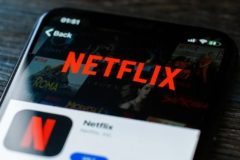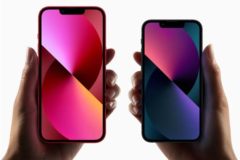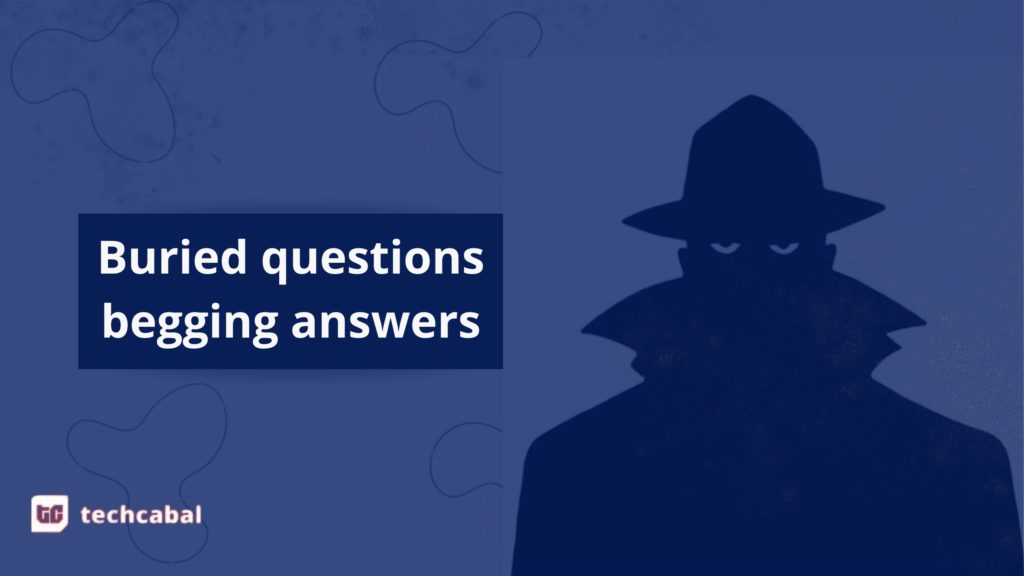
In recent years, the Nigerian digital space has witnessed a significant surge in scams that has led to the loss of billions of Naira to fraudsters. These scams range from ponzi schemes to investment fraud, to faux crypto trade, and many more. According to a recent report by The Guardian, Nigerians have lost almost a trillion naira to Ponzi schemes in the last 23 years. Some of the more notorious fraud schemes in recent Nigerian history include MMM, EatRich, TonsoElite, 360Hub, Cryptosilv, Racsterli, Chinmak, and so on. These elaborate schemes have robbed millions of Nigerians of their hard-earned money.
The success of some of these scams can be attributed in part to influencers and celebrities lending them legitimacy at the start of their operations. It is almost common practice now for businesses to contract influencers to endorse their products and services and attract customers. But what happens when things turn sour and the business is revealed to be less than legitimate? In many cases, the influencers/celebrities, whose popularity lent credence to these businesses, simply disassociate their brand from the scams and move on, leaving their followers to their fate.
This begs the question: how culpable are influencers and celebrities for losses incurred by their followers to brands they endorse?
The case of Zzapo Mobile illustrates this situation. In 2019, an unknown brand, Zzapo Mobile swept into the smartphone industry, disrupting the space with ridiculously low prices and endorsements from selected influencers and celebrities. Despite a promising start, Zzapo Mobile would go on to swindle thousands of Nigerians of millions of naira in a case that never quite received attention.
Zzapo’s launch seemed well-timed to coincide with the rise in costs of Android phones with sophisticated features. As a consequence, people were on the lookout for more affordable alternatives. Enter Zzapo, with an affordable and feature-rich smartphone.

The specifications of the Zzapo mobile looked incredible and, for that year, seemed worth the go, despite it not being a well known brand like Tecno, Itel or Infinix. It promised 4GB RAM, 64 GB ROM, and many more amazing features. The best part was the unbelievable entry price of the phone: ₦7,999 naira (about $16).
Tagged as an introductory offer, the ₦7,999 price was only available for preorders, and buyers would have to wait 21 days to receive their orders after payment.

The introductory offer price was slated to last till December 6, 2019, after which it would return to a “promo price” of ₦45,000 till December 31, 2019, and then return to its “original price” of ₦108,000 in January. Perhaps this erratic pricing model was the first sign that all was not as it seemed at Zzapo Mobile.
Zzapo Mobile also enlisted popular skit maker, Broda Shaggi, and tech enthusiast and current CEO of Azapay, Jackye Madu to endorse the phone. The former made a skit to validate the authenticity of the phone, while the latter was physically present at an unveiling event.

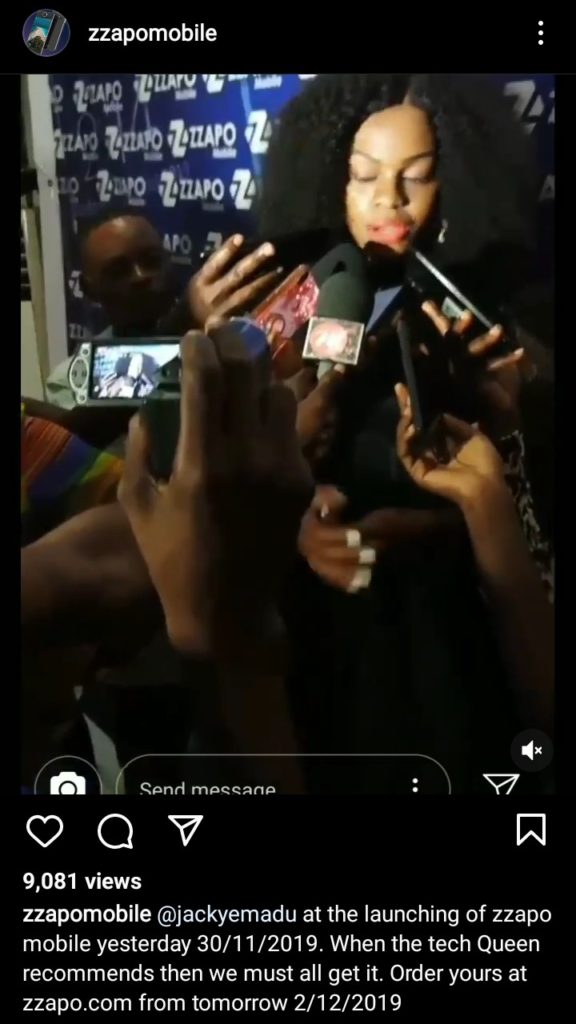
Journalists jostling to interview Jackye Madu

Zzapo mobile team alongside Jakye Madu at the launch
The company also enlisted Otumbadi Chikodi, a digital marketer known as @hrmqueenluciana on Instagram, to review the smartphone on her page.
Due to a spike in orders, presumably as a result of the influencer endorsements, Zzapo extended the preorder date to December 11, claiming it was to allow those who had experienced difficulty in placing their orders before the initial deadline also enjoy the preorder price. However, Zzapo Mobile did not end the sale until December 13.

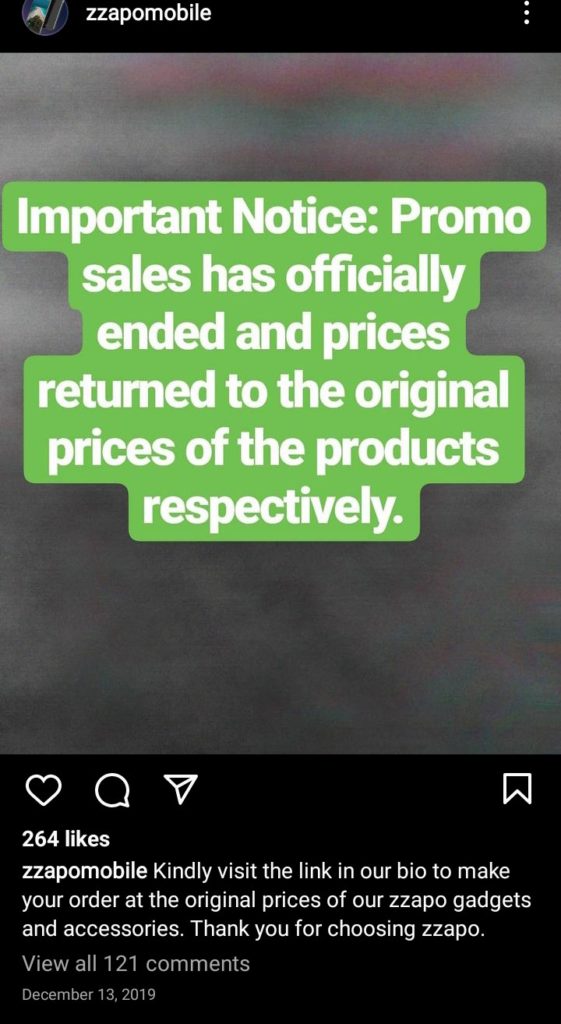
Introductory offer price halt on the 13th of December, 2019
After the end of sale announcement, the Zzapo social media pages went quiet. After five days, they returned to announce an abrupt end to the sales price of ₦45,000, originally slated to last till the following year.
Things only went downhill from there. As the days passed, complaints of no tracking numbers or order confirmations flooded Zzapo’s social media pages. The only evidence of purchase buyers had was the automated email from Paystack, Zzapo’s payment gateway.
Visits to Zzapo’s physical outlet revealed a small, relatively empty space with no gadgets or phones on sale.



On December 23, the proposed delivery date for the pre-ordered Zzapo phones, the brand announced that they were still processing orders, and asked for patience, advising those who could not wait to request refunds.
That was the last Nigerians would see and hear of Zzapo Mobile.

For many who patronised Zzapo Mobile, refunds were difficult, and in some cases, impossible to get. Those who involved law enforcement recovered part of their money, while reportedly forfeiting the rest to the police.

A victim who was lucky enough to get part of their
money back through the help of the police
Others tried chargebacks to Paystack, and while some had their money refunded, majority were unable to, as Paystack had already processed their payments to Zzapo.

One of the victims posting their response from Paystack
We spoke to a victim, “Ola”, who ordered two phones at the introductory offer price of ₦7,999. Describing his experience with Zzapo Mobile, Ola said, “I came across the Zzapo phone on Broda Shaggi’s timeline on Instagram and for his calibre of person, I had no reason to doubt the legitimacy of the product and company. So I ordered for two. Only for everything to turn out to be false. What pained me most was that Broda Shaggi didn’t address the issue. In fact, I think he blocked me and my friend on Instagram alongside other people who were dragging him to say something about it. That was how I lost 15k plus at that time. It really pained me because I really needed a phone then.”
Ola also shared the receipts of his purchase and his unsuccessful attempt to get a refund from Paystack. See images below:

Ola’s 1st receipt for one of his Zzapo mobile phone orders
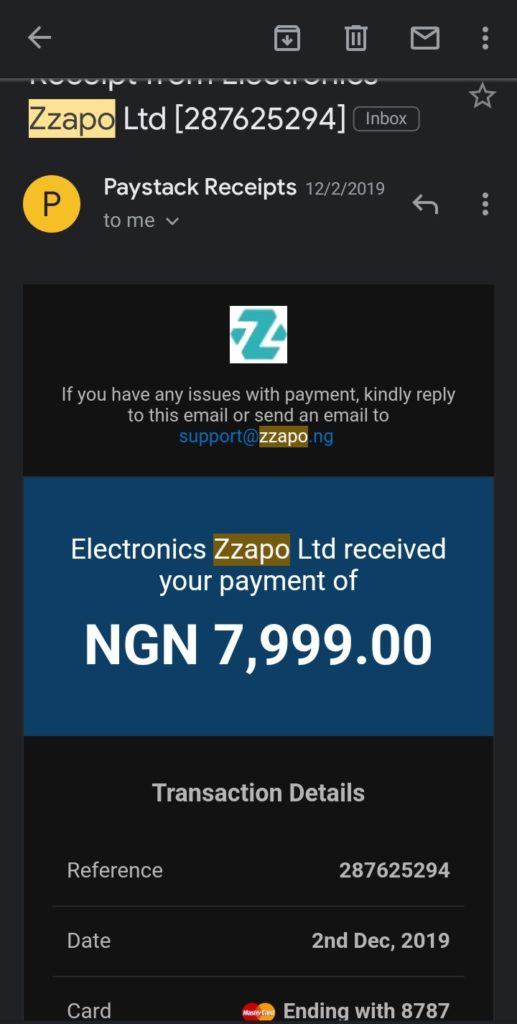
Ola’s 2nd receipt for one of his Zzapo mobile phone orders
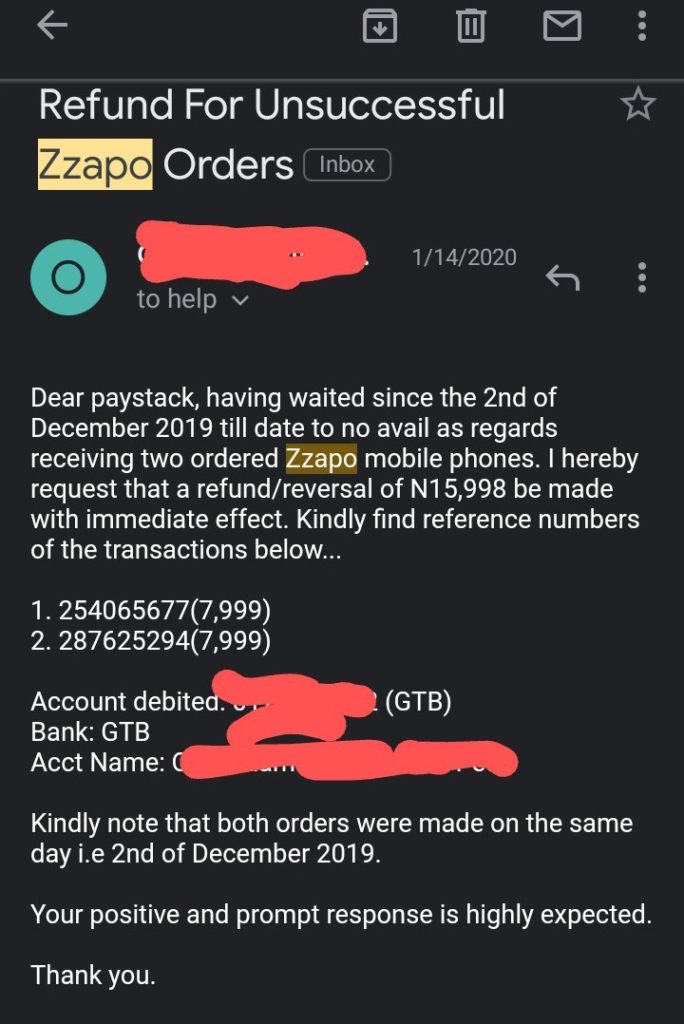
Ola’s request for refund
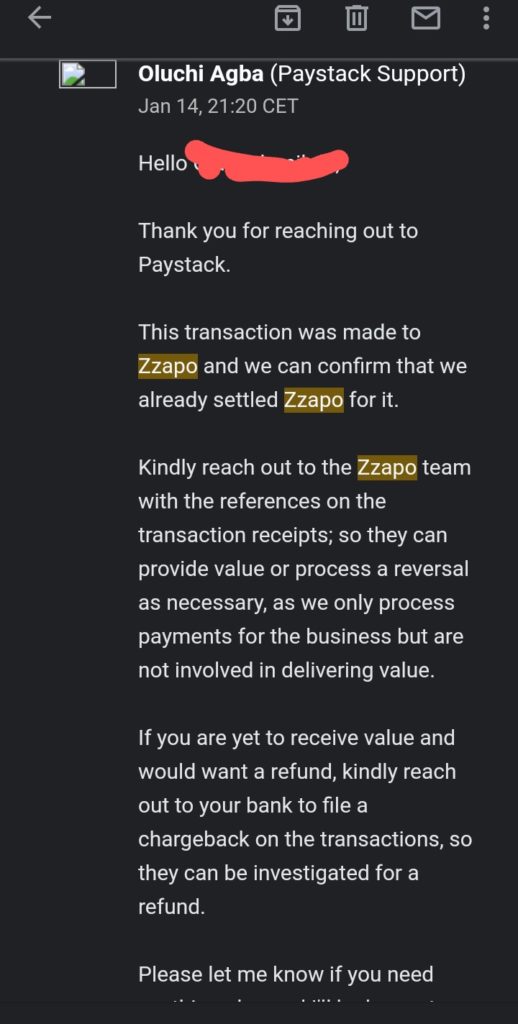
Paystack’s response to Ola’s refund request
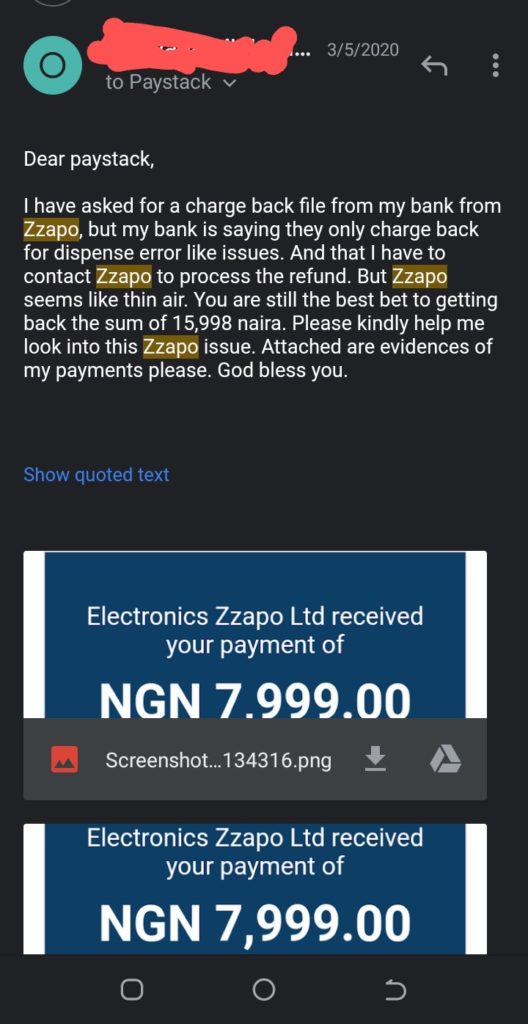
The last mail he sent to paystack unfortunately to no avail
Another victim, Mrs Ojeranti, shared her story with TechCabal. She said, “I don’t like remembering that period. It wasn’t even as if I had plenty money then. But I saw it as an opportunity and I asked my friend to help me order. That was how they ran away with my hard-earned money.”
A deeper dive into the Zzapo Mobile scam revealed that there was no visible CEO, board members or staff behind its social media pages. The only prominent names and faces attached to the brand were the influencers contracted to promote the phones, who largely ignored the queries from affected parties on their social media pages and reportedly blocked those who reached out to them.
Till date, Zzapo’s social media accounts remain inactive, with none responding to our requests for comment. TechCabal also reached out to Jackye Madu and Broda Shaggi to enquire about their Zzapo endorsement and its outcome. In response, Jackye stated that 2019 was a long time ago and she couldn’t remember anything. Broda Shaggi, on the other hand, neither read nor responded to our messages.
Sadly, the Zzapo case is not a one-off. Many such scams have occurred and slowly faded without resolution. In some cases, celebrities are either knowingly or unknowingly used to legitimise the business to the unsuspecting public. Some examples of such businesses include Racksterli, passively endorsed by Davido, and TonsoElite, indirectly given a platform by Channels TV through Ebuka, a popular media personality. The most recent of them is the endorsement-gone-south involving popular skit maker and comedian, Sabinus, who promoted an alleged crypto trading/investment company known as AI Mining.
In almost all such cases, the influencers simply move on, leaving thousands or even millions of people defrauded and distraught while the scam perpetrators go scot-free. In cases where they are caught, victims hardly recover what they lost fully, or at all.
These cases thus raise an important question: what is the duty of care owed by influencers and celebrities to their followers in verifying the authenticity of brands they endorse? With the conspicuous absence of a regulatory framework ensuring quality control in the endorsement/advertising space, should the need for accountability fall to the influencers and celebrities, whose reputations and social currency are their means of making a living?
There are laws and regulations that are meant to curtail cases like this—the Investments and Securities Act 2007, instituted by the Securities and Exchange Commission and the Investment Securities Tribunal; the Advance Fee Fraud and Other Fraud- Related Offences Act. Similarly, Nigeria also has the Economic and Financial Crimes Commission (Establishment) Act, which establishes the EFCC charged with pursuing such these types of crime. However, the victims seem to be more at the mercy of the perpetrators than the justice system.
The prevalence of such scams using the endorsement of popular influencers as a smokescreen may offer a callback to the regulatory move made by ARCON in 2022 to regulate the advertisements social media influencers may be allowed to make. One may ask if such a policy would be effective in curbing the rampant spread of fraudulent activities in the industry.











